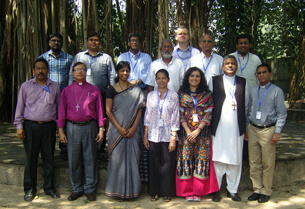Fron 17-19 February 2015 representatives from the provinces of Bangladesh, India, Pakistan and Sri Lanka attended the Anglican Alliance’s South Asia consultation.
The consultation brought leaders together to better understand their common priority issues and build relationships across the region. Together they committed to a shared strategy and discussed the role of the Anglican Alliance in its support of their collaborative work.
Michael Roy, Anglican Alliance Facilitator for South Asia, said, “Despite the many challenges facing the region the group acknowledged huge strategic scope for their priority issues, and the opportunities to work with the mandate of the Anglican Alliance. The spirit lies not in immediate success but in the coming together to work together with the hope and promise that God’s Kingdom will come.”
Each country highlighted their priorities in development, relief and advocacy and discussed emerging issues in the region and how these new challenges were impacting their work.
Two particular panel discussions were led by multi-religion leaders and experts, one addressing the issue of minorities and interfaith issues, and another addressing people and development.
Panelists stressed the necessity and scope of working together with different religious communities based on their common ground and shared values in ensuring the well being of all people, particularly the oppressed and vulnerable. They went on to call for clarity in the way in which development issues are defined and how church work can best progress for the benefit of all people.
Thematic workshops were led, first by country and then in groups focused on particular priorities. Three key issues discussed were:
- Working for the liberty of garment workers and the bonded labours from slavery;
- Strengthening interfaith dialogue and collaboration to safeguard the minority religion communities so that they can live in peace and justice; and
- Working for economic empowerment with focus on vulnerable women.
Strategic proposals to take this work forward included a specific South Asia forum, and to assign a base in each country where communication would be facilitated and action plans would be determined.
In a field visit to a coastal fishing community, the participants met with displaced fishermen who have been forced from their land under pressure from larger development projects. Another visit exposed participants to the plight of garment workers in Sri Lanka, and the need for a recognition of their human rights.
Participants included Rt Revd. Dhiloraj Canagasabey, Bishop of Colombo, Sri Lanka, Rt. Revd. Humprey S Peters, Bishop of Peshawar, Pakistan, Rt. Revd. Paul S Sarker, Bishop of Dhaka and Moderator of Church of Bangladesh, as well as priests, church leaders, development partners, and the heads of different church ministries.
The Anglican Alliance is extremely grateful to the Diocese of Colombo for hosting the event, and to Nagulan Nesiah from Episcopal Relief & Development, Fr Jayasiri Peiris and Jennifer Aturupane, the Secretary for the Board of Mission in the Diocese of Colombo, for their hard work and kind support in the organisation of the consultation.
After the consultation, Anglican Alliance Co-Director Andy Bowerman attended two events in Colombo. In the first event he met Anglican Church leadership to introduce the Anglican Alliance’s history, mission and vision, and the three priority areas for its mandate. He highlighted the way in which the region of South Asia was particularly important in realising gender equality, responding to the most vulnerable and marginalise, and building a just and sustainable world.
In the second event Andy spoke with Anglican School Principals and Youth Leaders, discussing the role of youth in development, relief and advocacy and the changes that have been experienced by youth and their approach to church. Participants went on to discuss the attitude and behaviour of young people and how the church might be more open and inclusive to the approaches and desires of young people.

